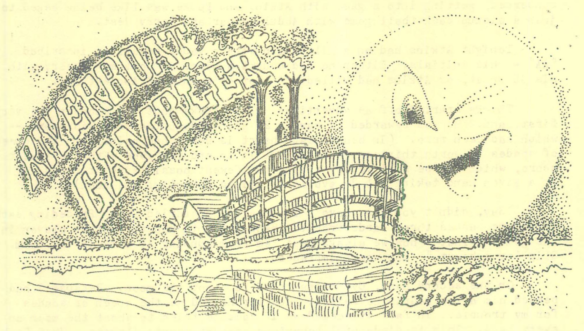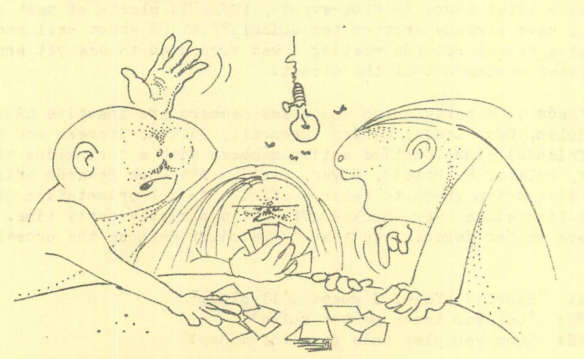
By Mike Glyer
People who gamble well are boring. Fortunately there’s nobody in LASFS who need fear being accused of boring play, when it comes to the fish and chips sessions. In fact, Craig Miller was trying to explain to us one evening after the club meeting that “Happy Family” was a popular European card game. We must have been slow catching on, because Miller needed this analogy: “LASFS cardgames are like a Happy Family. They spend all of their time together yelling at each other.”
Even though the cardplayers of’ the LASFS are now more relics of past glory than a vital force in club events, there is plenty of past glory to go around. I have already written for Scientifriction about Hell and LASFS poker. However, at a recent Petards meeting I was surprised to see yet another breed of cardplayer coming out of the closet.
Petards is a party group whose key members are inactive LASFSians (Locke, Hulan, Cox, Lewis, Condra, Grennell, Gillen, Stevens and their wives and girlfriends) plus longtime active members with a sprinkling of youth (Moffatts, Pelzes, Rothstein, Glyer, etc.). Although Petards originated as a sercon discussion group to balance the social orientation of LASFS, that image has long since been shucked off. It’s strictly party time. In fact, things have so far degenerated that there might even be the occasional card game.
CY CONDRA: “Hearts? Yeah, I guess I’ll play.”
LON ATKINS: “Can you teach me the rules?”
DAVE LOCKE: “Can you play this game for money?”
Now even I knew better than that. Legendary Hearts Player Alonzo Atkins (to use a TIME magazine style sheet) is mentioned amongst rabid Hearts Players of the South in the same breath as… Hank Reinhardt… Don Markstein… Guy Lillian… Gee, I used to think Atkins was a good guy. As far as I was concerned, getting into a game with Atkins and Locke was like being asked to join a pickup basketball game with Abdul-Jabbar and Jerry West.
Tonight Atkins had on a gilt chain with a gaudy medallion inscribed ” AA” — his initials. Either he had bought a piece of costume jewelry with his ID on it, or Atkins had killed off another magnum of Ancient Age.
Things started off as advertised. Dave Locke shot the moon on the very first hand. He was rewarded by having 26 points deducted from his score — which had been zero. (In hearts each heart is worth one point, and the queen of spades is worth thirteen. The object is to end the game with the lowest score, which may be achieved by taking the fewest possible point cards, or on a given hand taking all 26 available points (shooting the moon).)
“Say, didn’t you pass Dave a low heart?” I queried Lon. Preceding each hand, one passes three cards from the hand dealt to you to another player in the game. “That’s how we always kept ’em from running it back in the dorm. Slip ’em a heart.” Lon was unimpressed.
On the second hand, Cy Condra tried to shoot the moon. Because I had passed him a low heart, he failed. However, he fed me the queen of spades for my trouble. In fact, it seemed as if someone tried to shoot the moon on every hand. This is disdainful behavior amongst hearts players. When Locke took only 25 points in one attempt to pull this coup, Marcia Hulan called it “pulling a Reinhardt.” Of course, she was 25OO miles away from Hank at the time … safer that way …
Scores mounted. Although I was not doing well, I found myself low man at 51. (The game ends when a player breaks 100.) Where was the sparkling play, the legendary invulnerability? “Even I could shoot the moon on these stooges,” I said to myself. And thereby proved the axiom that there’s nothing wrong with talking to yourself, it’s when you start to listen that you’ve got a problem. By the time I discovered the error of my belief, I had a score of 99. Locke dropped my 100th point on me with a smile.
I had just expected so much more. “You know, Lon, I thought you’d be a really tough opponent.” I put 50 cents in his hand. Turning to Cy I said, “Pretty close, eh?” and paid him 45 cents. “Say, Dave, sure seemed like you tried for the moon on every hand.” I forked over 70 cents. What a feeble exhibition the masters had staged. “Can anybody break a five?” I asked.

[Originally published in Holier Than Thou #4 (1979). Art by Joan Hanke-Woods.]
Discover more from File 770
Subscribe to get the latest posts sent to your email.
